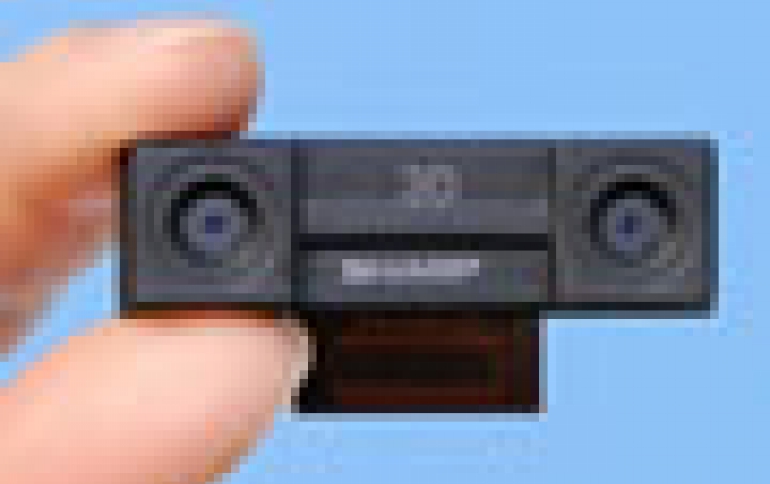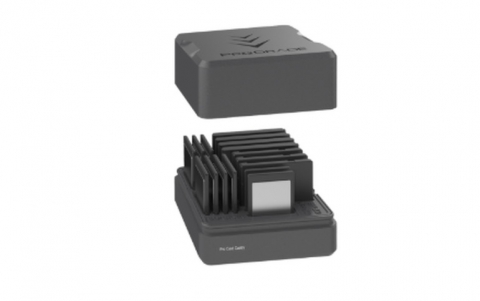
Sharp Develops 3D Camera Module for Mobile Devices Capable of Capturing HD 3D Video
Sharp has developed a 3D camera module for mobile devices capable of capturing high-definition (720p) 3D video images.
Sharp will start shipping samples in July. Mass production of these modules will begin within 2010.
3D images are composed of two views taken using two cameras that simultaneously capture separate images for the right and left eyes. Consequently, a 3D camera requires peripheral circuitry to apply image processing to the two images, for example, to adjust color or to correct positioning between the images from the two cameras. Manufacturers have thus been pursuing designs that reduce the size and weight of 3D cameras and seeking ways to shorten their development period.
 The current 3D camera module developed by Sharp incorporates functions to process the image data output by the left and right cameras, including Color Synchronizing Processing to adjust color and brightness, Timing Synchronizing Processing to synchronize the timing of the video signals, and Optical Axis Control Processing to correct positioning. In addition, Fast Readout Technology rapidly transfers video data from the image sensor, enabling 3D images to be captured in high-resolution HD mode. Further, in developing this camera module, Sharp applied high-density mounting technology nurtured over long years of experience in camera module development to achieve a compact form. Embedding this camera module in mobile devices such as digital cameras, mobile phones, and smartphones would contribute to the development of a wide range of new communications tools.
The current 3D camera module developed by Sharp incorporates functions to process the image data output by the left and right cameras, including Color Synchronizing Processing to adjust color and brightness, Timing Synchronizing Processing to synchronize the timing of the video signals, and Optical Axis Control Processing to correct positioning. In addition, Fast Readout Technology rapidly transfers video data from the image sensor, enabling 3D images to be captured in high-resolution HD mode. Further, in developing this camera module, Sharp applied high-density mounting technology nurtured over long years of experience in camera module development to achieve a compact form. Embedding this camera module in mobile devices such as digital cameras, mobile phones, and smartphones would contribute to the development of a wide range of new communications tools.
Sharp plans to open up new 3D markets based on 3D display technologies, including small/medium-size and large-size 3D LCDs, as well as on 3D input device technologies such as 3D camera modules.
3D images are composed of two views taken using two cameras that simultaneously capture separate images for the right and left eyes. Consequently, a 3D camera requires peripheral circuitry to apply image processing to the two images, for example, to adjust color or to correct positioning between the images from the two cameras. Manufacturers have thus been pursuing designs that reduce the size and weight of 3D cameras and seeking ways to shorten their development period.
 The current 3D camera module developed by Sharp incorporates functions to process the image data output by the left and right cameras, including Color Synchronizing Processing to adjust color and brightness, Timing Synchronizing Processing to synchronize the timing of the video signals, and Optical Axis Control Processing to correct positioning. In addition, Fast Readout Technology rapidly transfers video data from the image sensor, enabling 3D images to be captured in high-resolution HD mode. Further, in developing this camera module, Sharp applied high-density mounting technology nurtured over long years of experience in camera module development to achieve a compact form. Embedding this camera module in mobile devices such as digital cameras, mobile phones, and smartphones would contribute to the development of a wide range of new communications tools.
The current 3D camera module developed by Sharp incorporates functions to process the image data output by the left and right cameras, including Color Synchronizing Processing to adjust color and brightness, Timing Synchronizing Processing to synchronize the timing of the video signals, and Optical Axis Control Processing to correct positioning. In addition, Fast Readout Technology rapidly transfers video data from the image sensor, enabling 3D images to be captured in high-resolution HD mode. Further, in developing this camera module, Sharp applied high-density mounting technology nurtured over long years of experience in camera module development to achieve a compact form. Embedding this camera module in mobile devices such as digital cameras, mobile phones, and smartphones would contribute to the development of a wide range of new communications tools.
Sharp plans to open up new 3D markets based on 3D display technologies, including small/medium-size and large-size 3D LCDs, as well as on 3D input device technologies such as 3D camera modules.





















